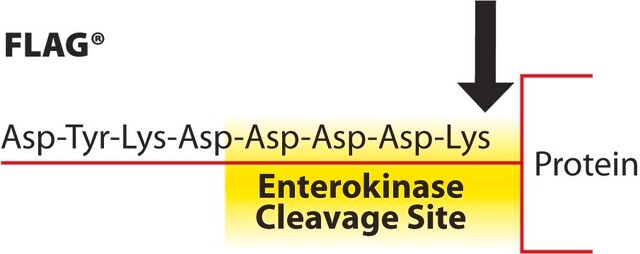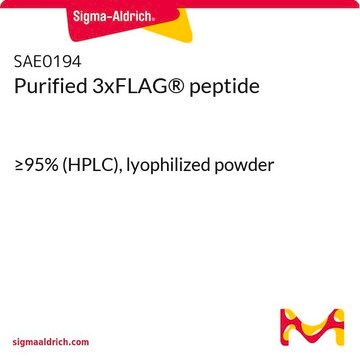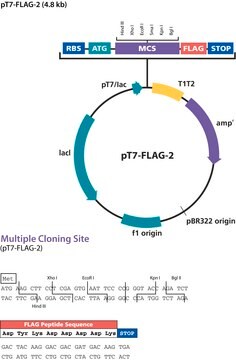E7908
p3XFLAG-CMV™-14 Expression Vector
shuttle vector for transient or stable intracellular expression of C-terminal 3xFLAG
Se connecterpour consulter vos tarifs contractuels et ceux de votre entreprise/organisme
About This Item
Code UNSPSC :
12352200
Produits recommandés
Étiquette/Marqueur
3X FLAG tagged
Qualité
for molecular biology
Forme
buffered aqueous solution
Conditions d'expédition
dry ice
Température de stockage
−20°C
Description générale
The p3XFLAG-CMV™-14 Expression Vector is a 6.3 kb derivative of pCMV51 used to establish expression of transient or stable intracellular C-terminal 3XFLAG™ fusion proteins in mammalian cells. The vector encodes three adjacent FLAG® epitopes (Asp-Tyr-Lys-Xaa-Xaa-Asp) downstream of the multiple cloning region. This results in increased detection sensitivity using ANTI-FLAG M2 antibody. Efficiency of replication and genomic integration is optimal when using an SV40 T antigen-expressing host.
The p3XFLAG-CMV-7-BAP Control Plasmid is a 6.2 kb derivative of pCMV5 used for transient intracellular expression of N-terminal 3XFLAG bacterial alkaline phosphatase fusion protein in mammalian cells. The vector encodes three adjacent FLAG epitopes (Asp-Tyr-Lys-Xaa-Xaa-Asp) upstream of the multiple cloning region. This results in increased detection sensitivity using ANTI-FLAG M2 antibody. The third FLAG epitope includes the enterokinase recognition sequence, allowing cleavage of the 3XFLAG peptide from the purified fusion protein.
Vector Maps and Sequences
The p3XFLAG-CMV-7-BAP Control Plasmid is a 6.2 kb derivative of pCMV5 used for transient intracellular expression of N-terminal 3XFLAG bacterial alkaline phosphatase fusion protein in mammalian cells. The vector encodes three adjacent FLAG epitopes (Asp-Tyr-Lys-Xaa-Xaa-Asp) upstream of the multiple cloning region. This results in increased detection sensitivity using ANTI-FLAG M2 antibody. The third FLAG epitope includes the enterokinase recognition sequence, allowing cleavage of the 3XFLAG peptide from the purified fusion protein.
Vector Maps and Sequences
Composants
- p3XFLAG-CMV™-14 Expression Vector 20 μg (E4901) is supplied as 0.5 mg/ml in 10 mM Tris-HCl (pH 8.0) with 1 mM EDTA.
- p3XFLAG-CMV™-7-BAP Control Plasmid 20 μg (C7472) is supplied as 0.5 mg/ml in 10 mM Tris-HCl (pH 8.0) with 1 mM EDTA.
Principe
The promoter-regulatory region of the human cytomegalovirus drives transcription of FLAG®-fusion constructs
Autres remarques
Browse additional application references in our FLAG® Literature portal.
Informations légales
This product is covered by the following patents owned by Sigma-Aldrich Co. LLC: US6,379,903, US7,094,548, JP4405125,EP1220933, CA2386471 and AU774216.
3xFLAG is a trademark of Sigma-Aldrich Co. LLC
FLAG is a registered trademark of Merck KGaA, Darmstadt, Germany
p3xFLAG-CMV is a trademark of Sigma-Aldrich Co. LLC
Produit(s) apparenté(s)
Réf. du produit
Description
Tarif
Code de la classe de stockage
10 - Combustible liquids
Faites votre choix parmi les versions les plus récentes :
Certificats d'analyse (COA)
Lot/Batch Number
Vous ne trouvez pas la bonne version ?
Si vous avez besoin d'une version particulière, vous pouvez rechercher un certificat spécifique par le numéro de lot.
Déjà en possession de ce produit ?
Retrouvez la documentation relative aux produits que vous avez récemment achetés dans la Bibliothèque de documents.
Yan Qun Chen et al.
The Journal of biological chemistry, 283(15), 10048-10057 (2008-02-02)
AGPAT6 is a member of the 1-acylglycerol-3-phosphate O-acyltransferase (AGPAT) family that appears to be important in triglyceride biosynthesis in several tissues, but the precise biochemical function of the enzyme is unknown. In the current study, we show that AGPAT6 is
Irina Malyukova et al.
Investigative ophthalmology & visual science, 47(1), 206-212 (2005-12-31)
The present study compared properties of wild-type and mutated mouse and human myocilin (Myoc) proteins as a prerequisite for development of a mouse model of glaucoma. cDNA encoding full-length mouse Myoc was cloned into the p3XFLAG-CMV-14 vector. Tyr423His and Ile463Ser
James A Snipes et al.
The Journal of pharmacology and experimental therapeutics, 313(2), 668-676 (2005-01-15)
A splice variant of cyclooxygenase-1 (COX-1), COX-1b (previously termed as COX-3), has been identified in canine tissues as an acetaminophen-sensitive isoform, but the sequence of COX-1b mRNA and the encoded protein are not known in rats. We cloned and sequenced
Masanori Matsui et al.
Journal of virology, 78(17), 9093-9104 (2004-08-17)
Searching the sequence databases has revealed two novel cytokines: interleukin-23 (IL-23) and IL-27. These cytokines are quite similar to, but clearly distinct from IL-12 in their structures and T-cell stimulatory fashions. In contrast to IL-12, however, little is known about
Qi-En Wang et al.
Cancer research, 72(3), 666-675 (2011-12-17)
XPC protein is a critical DNA damage recognition factor in nucleotide excision repair for which genetic deficiency confers a predisposition to cancer. In this study, we show that XPC has a function that is independent of its canonical function in
Notre équipe de scientifiques dispose d'une expérience dans tous les secteurs de la recherche, notamment en sciences de la vie, science des matériaux, synthèse chimique, chromatographie, analyse et dans de nombreux autres domaines..
Contacter notre Service technique








